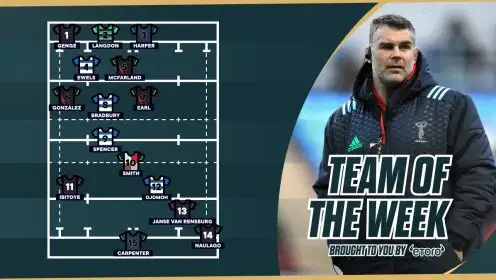Loose Pass: Quirks of a formula, perceptions of recklessness and of advantage, and the Smiths

Bristol Bears lock Josh Caulfield, Harlequins fly-half Marcus Smith and Northampton Saints pivot Fin Smith.
This week we will mostly be concerning ourselves with the quirks of a formula, perceptions of recklessness, perceptions of advantage, and notes on the England fly-half question…
What’s wrong with a rematch?
Despite the obvious disclaimer that you have two teams qualifying for the round of 16 who won only one game out of their four, the Champions Cup did indeed deliver a pretty handy final weekend of pool rugby. Northampton conquered the odds and the elements in Munster. La Rochelle are back to their old selves. Harlequins are so much fun to watch. Leinster remain unshakeable, Saracens do not.
Whatever your allegiance – and assuming you have very patient partners and families – it was an outstanding weekend of watchable rugby, with rivalries beginning to build as in the good old days. And now there’s some fun knockout rugby to soften the blow of the Six Nations finishing in March.
So quite why the pairings for the round of 16 have been so derided has left us at PR towers a little surprised. It is absolutely a quirk that so many of the round of 16 ties are repeats of pool games; one or two might have been to be expected, five is quite something. But why are rematches suddenly a bad thing?
Back in the really, really good old days, the best aspect of the Heineken Cup pool stages was the home and away bit, the grudges that built, the close away defeats to be avenged on the final pair of weekends, and lest we forget, that awesome 10 days in early December when teams would play each other home and away.
The best thing about any of the weird and wonderful formats before this one turned out to be the two-legged clashes. They weren’t all classics, but few who watched will forget the one-point wins for Montpellier and Toulouse over Harlequins and Ulster respectively, or Munster roaring back to knock out Exeter. Last season’s edition missed them dreadfully; and every single knockout game bar the final was won by the home team (La Rochelle playing Exeter in Bordeaux is a home game for La Rochelle here). Rematches are a good thing. Stories build. Emotions stay raw.
Looking at the rematches on offer: can you possibly imagine that Munster and their travelling hordes won’t descend on Franklin’s Gardens bearing a bit of a grudge? Or that Saracens won’t be keen to put right the wrong against Bordeaux (or that fans won’t mind one jot the south of France in late spring)? Or La Rochelle, denied a result in Cape Town by a surprise TMO intervention, wouldn’t want another crack? Meanwhile, we’ve also an appetising west country derby between Exeter and Bath to look forward to.
The current pool format is, as has already been written here on a couple of occasions, not the greatest, but it is a huge improvement on the horrible two-pool, 12-team three-game format from the last couple of years which was almost impossible to decipher. Blaming EPCR for all of it is a little rich too; remember, it was basically the French and English clubs and unions who clamoured for changes to the format and numbers of teams from each country involved, arguing that they were not getting enough bang for their buck.
This is a debate to be had later: being as we now have 24 teams, Loose Pass would love nothing more than a return to the old six pool home and away format. But for April, we’d suggest leaving the format alone and enjoying the rematches. There are plenty there which are not a foregone conclusion; also not something you could have said about previous editions.
How bad is reckless?
Two red card incidents at the weekend provoked a lot of opinion, not all of it consistent. Josh Caulfield and Curtis Langdon both received their marching orders for incidents which culminated in nasty injuries to opponents. And it was hard to argue against either completely. Certainly Langdon had absolutely no need to move his knee for a second time, while Caulfield was completely out of control in a situation where he could have kept control a lot better.
Match officials in both cases pointed to the recklessness of the acts and the contact to the head in each case as being enough – one of the officials went as far as to call Caulfield’s stamp intentional.
🗣️ "Properly dirty play punished as it should be." #MUNvNOR
🟥 Fans divided on Saints red card. #InvestecChampionsCup 👇 https://t.co/mvz0fkYkwV
— Planet Rugby (@PlanetRugby) January 20, 2024
That’s wrong, nobody has a camera in the player’s head. But to insist the act be excused because it is not intentional is wrong as well; as several commentators reminded us: players have a duty of care and reckless acts can damage this. It sounds all hyper-sensitive and a bit snowflake but if the alternative is lots of concussions and broken faces because of recklessness then we’ll take the flake. Those who argue against it all misty-eyed and cite the ‘men were men’ aspect of yesteryear might do well to go back and watch a game from yesteryear; in no universe were the games generally better than they are now, and a lot of that is to do with the fact that players are generally far more accurate and far less reckless.
So reckless is bad enough, and both players. But what was never mentioned in either case – particularly pertinent in the Caulfield incident – was mitigation, the same mitigation that meant Brice Dulin only saw yellow and not red for a tackle on Arron Reed. And that is a concept that clearly needs refining.
The Smiths
Give Smith the keys to the England backs. Smith sinks opponents with another fine display. England’s Smith makes a cast-iron case. Et cetera.
Marcus Smith? Well, yes, but also no. For while Marcus did what only he can do in Harlequins’ breathless dismantling of Ulster, namesake Fin gave as classy a steering of Northampton past Munster in rough conditions in Ireland.
Marcus will forever split opinion: a maverick talent with skill and pace levels few other peers can match but a penchant for errors and moments of derring-do when there is simply no need to take the risk. It remains the bugbear for his international coaches, whose appetite for risk is understandably miniscule. It remains the reason why Owen Farrell remained ahead of Marcus in the pecking order.
With a Fin/Marcus combination, the loss of Farrell may become a softer blow. If Fin can steer England through the choppy waters as he did Northampton, and Marcus can continue cutting defences to ribbons as he did Ulster’s, it would appear England have a pair of generational fly-halves to pick and choose from according to situation.
But who to start…



